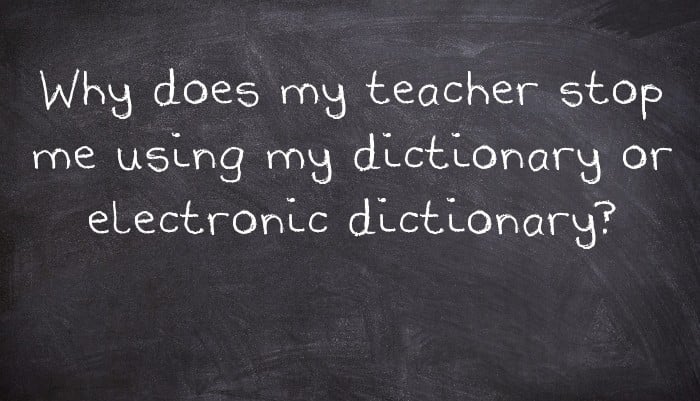Why does my teacher stop me using my dictionary/ electronic dictionary?
Fluency
If you stop and look in your dictionary every time you can't think of a word, you will never get used to speaking fluently without pauses and listening to you speak will be difficult and boring.
Stop translating
It is difficult to look for words you don't know in English in a dictionary without using your own language, but it is possible to ask your teacher or another student a word just by explaining what it is, using a gesture or drawing it. If you stop using your own language in the classroom, this will help you learn communicate and to think in English.
Guessing from context
If you read a whole text without a dictionary, many of the words you didn't understand when you first saw them will become clear from the rest of the story and/ or you will be able to see that they are not important to understand and learn. Learning this skill of guessing from context will improve your listening and reading speed, and your ability to cope with people speaking at natural speed.
Waiting for the right time
There are particular parts of the lesson where dictionaries are useful, such as planning what you are going to say in a presentation or choosing five words from a reading to learn. There are other times when using your dictionary is a bad idea, such as during chit chat or while listening to a CD. If you think your teacher stops you using your dictionary even when it is a good time, you could try asking them which parts of the lesson it is okay to use your dictionary in.
Teaching you how to use it first
Although using a dictionary seems simple, reading the phonemic script, choosing the best definition and copying it into your notebook are all skills that take some time to develop. Your teacher might be planning to teach you those things before letting you use a dictionary more often.
Exam practice
Most English language exams like IELTS and TOEIC do not allow dictionaries, so your teacher making you read and listen without a dictionary is good practice for that.
Classroom control
If students can use their dictionaries whenever they like, this often produces lots of chit chat in L1 and students not listening when the teacher is explaining things like the rules of games. If you want your teacher to trust you to use your dictionary, try to use it quietly and only when you are sure you won't be missing anything important.
Learning to explain words you don’t know
If you do a speaking exercise with no dictionary you will have to use language like "It's a kind of...", "It looks like..." and "He is a person who..." that you will need in real life communication all the time too. When the teacher and other students explain vocabulary to you, you will also hear a good model of this kind of necessary language.
Listening to what people are saying.
If you are using a dictionary while someone is speaking, or even just thinking about when you can use it, you are probably not listening properly. This will mean that you don't understand well and that you seem very rude to the person who is speaking.
More speaking and listening
Asking questions about vocabulary and explaining things to other people increases the amount of speaking and listening in class, whereas looking in a dictionary has no useful practice of the four skills.
Working together
Students and the teacher helping each other by explaining vocabulary can really help produce a good atmosphere in class.
Confidence
Students who are nervous often reach for their dictionaries without even knowing what they are looking for just to make them feel "safe". If you learn to communicate without using your dictionary at all, this will stop you feeling nervous each time you have to communicate without it in real life.
Checking your understanding
If students all look at their own different dictionaries and then say "Yes, I understand", the teacher has no way of knowing how many of the students really understood. By the students explaining what they think it means and asking questions, the teacher can more easily check if they are really understanding.
Using other reference resources
Rather than reaching for your dictionary automatically, your teacher might be training you to look at the vocabulary list at the back of the textbook or at your own vocabulary list in your notebook.
Functional language
When you ask other people to help you with vocabulary you have to use lots of useful language like "How do you spell it?" and "Can you repeat?" that you will not be able to practice just by looking in your dictionary.
Using dictionaries when you have been told not to
If students use dictionaries during the parts of the class when they have been told not to, their teacher may have no choice but to ban dictionaries in class completely. You can stop this happening by asking your teacher if you can use your dictionary during particular stages of the class.
Students not trusting the teacher
Some students don't believe their teacher if their dictionary says something different. In 95% of cases it is the teacher who is right. If the teacher wastes time in too many classes with "But my dictionary says..." conversations, they might decide to ban dictionaries in class completely.
Bad dictionaries
Many bilingual and electronic dictionaries are actually quite badly written. Bad points include incorrect translations, only one translation or definition, old fashioned language, and different pronunciation guides (not phonemic script). If all students have a more reliable and detailed dictionary, such as a monolingual dictionary published by a big British or American publisher, the teacher might be happier about you using them more often.
